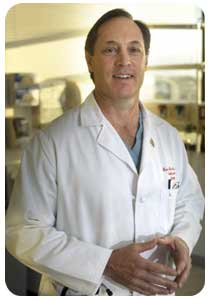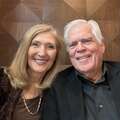“What Percent of Heart Valve Surgeries Are Re-Operations?” Asks Marc
By Adam Pick on September 14, 2010
I just received a very interesting email from Marc about heart valve surgery re-operations. He writes, “Adam, I’m an active 47 year-old just diagnosed with severe mitral regurgitation. I can’t help but think that I’ll need a 2nd surgery if I get a repair or a tissue valve. Do you know what percent of valve surgeries are re-operations? Are they primarily from surgical error or degenerative reasons? Thanks, Marc”

You can probably understand why I wanted to feature Marc’s email… He asks a great question. Unfortunately, I did not have a great answer. So, I contacted Dr. Kevin Accola, M.D. and Dr. Paul Stelzer, M.D. — two leading heart valve surgeons to learn more about heart valve re-operations.

Dr. Kevin Accola, M.D.
In response to Marc’s question, Dr. Accola, who practices at AdventHealth (formerly Florida Hospital) in Orlando, wrote:
Most institutions with significant volume do between 10% and 15% redo’s on average… Mine is about 12% in regards to patients who have had previous bypass surgery and now need a valve procedure, or a redo valve which has degenerative changes and now needs to be replaced. Sometimes these valves can calcify or the initial degenerative process continues and over time progresses to the point that the valve needs replacement.
Specific to Marc’s question about surgical error, Dr. Accola noted:
Redo’s for “surgical error” is quite low. Although it demonstrates again why a patient should seek out an institution or a surgeon who does a significant volume of valves and has obtained an “experience” with valve repair or replacement. This also demonstrates why we prefer to repair valves earlier as the tissues are typically better with less calcium and more likely repairable.

I then heard from Dr. Stelzer, a heart valve specialist at Mount Sinai Hospital in New York, who shared:
Valve re-operations are very rarely due to “surgical error” but there is definitely a slow degenerative process that affects tissue valves that ultimately leads to re-operation unless the patient is over 70 at initial surgery. As for coming up with a number for what percent of valve operations are re-do cases that is a little hard to estimate. I looked up the New York state data base for the most recent reporting period that has been published (2005-2007). It lists the percentage of valve operations that have had previous open heart surgery as 18.2%. It should be noted that a patient who had previous bypass surgery and then gets a valve operation is included here so it’s not quite the same as a “failed valve” operation. There are also some patients who get endocarditis on a previous aortic valve and have a complete root replacement with a homograft to fix this. These patients are notcounted as valve surgery by the New York state system – the root replacement is considered “other” and these are counted separately with less common operations such as arch replacements, transplants, etc. That’s a bit of a long answer to the question, but the short version would say between 10-15% of operations on valves are reoperations.
For me, these responses were incredibly helpful in learning more about heart valve re-operations. It was also very interesting to see the relative consensus of Dr. Accola and Dr. Stelzer specific to Marc’s inquiry.
Thanks to Marc for his question and thanks to Dr. Accola and Dr. Stelzer for sharing their surgical expertise.
Keep on tickin!
Adam
|
John Zucker says on September 14th, 2010 at 10:40 am |
|
Adam, I very much enjoy your blog. In July, at age 44, I underwent mitral valve repair at the Cleveland Clinic by robotic assist. Prior to surgery I had been living asymptomatically with severe regurgitation but then contracted endocarditis and it was time for surgery. Naturally, I did my homework and was concerned about long-term prospects as well as the likelihood of re-operation. I saw similar stats of 10-15% after repair, but figured that it was far preferable to replacement. By the way, the robotically-assisted procedure performed by Thomas Mihaljevic was amazing. Not only was I discharged in 3 days, but on that 3rd day I spent an hour and a half touring the Cleveland Art Museum. That evening I went to a friend’s bar-b-que for dinner and flew home the next day. |
 |
|
Cindy McGinn says on September 14th, 2010 at 2:43 pm |
|
Hi Adam, |
 |
|
Randy Heimerl says on September 14th, 2010 at 8:04 pm |
|
Hi Adam, |
 |
|
Zee says on September 15th, 2010 at 2:29 pm |
|
my husband had the mitral valve repaired August 3, he seem ok to be discharged, one week later he had to have his heart shocked. that was successful. during this time his eating is non existant. unable to eat. Sept 7th he had a stroke on his left side, dr said he expects a full recovery. The vomitting stop but he is still unable to eat, unable to deal with scents, he has zero feeling to eat anything. His heart is back in sinus since saturday but for 2o mins yesterday was off. He is very depressed. He could be discharged tomorrow but I am afraid for him and how care for him if he is not eating. This morning we were told the valve is still leaking. What now. |
 |
|
Jim Hilbe says on September 15th, 2010 at 7:34 pm |
|
Adam and friends, The Cleveland Clinic website has a document available called “Outcomes 2009”, which was recently completed for the latest full year of all procedures done at the Clinic. They performed a total of 2,677 valve procedures; 1,981 or 74% were primary operations (including my wife’s AVR), while 696 or 26% of them were re-operations. This is a considerably higher redo rate than the others mentioned here. One factor is they do far more total valve operations than any other facility, and they use a lot of biological valves. I hope this sheds more light on the question. |
 |
|
Sherri Hendry says on September 15th, 2010 at 7:51 pm |
|
I am glad this subject came up. I will be one of those re-op statistics in the future. After my last echo in May, I learned my MV was again a moderate leak. My MVR was in January of 2009. After surgery I had a tiny tiny leak which I was told is normal. By late last summer, the leak went to a mild-moderate. I was also told in May that a replacement will be in my future. The repair is doing what it is suppose to do, but my leak is from calcification due to years of wear/tear. However, at time of repair, the valve was still in decent shape. For Dee – tell your husband to hang in there! We are rooting for him and our hearts go out to both of you. |
 |
|
Don Hull says on September 16th, 2010 at 2:12 pm |
|
I am a “re-op” patient. In April ’09 I went in to have a mitral valve repair. For a day or two, they said everything looked ok. Then my heart didn’t have sinus rhythm. After it did get into sinus rhythm, I then developed hemolytic anemia. It seems the valve was leaking in a different place than before surgery and it was physically damaging red blood cells. So I then was told it was time for a valve replacement. I chose tissue over mechanical, and they placed an Edwards Bovine tissue valve. After surgery, recovery went slow but sure, and I was finally discharged. After getting home, I got stronger and stronger, mainly due to a terrific rehab program. It took a while but now I’m back to work and feeling great. Note to Zee- As others have said, we are pulling for you and your husband. Don’t be afraid to ask for a second or even a third opinion. Don’t give up. |
 |
|
Kathy Cooper says on September 17th, 2010 at 5:02 pm |
|
I recently had triple bypass, I only had 20% of my heart working before surgery and 20% working after surgery. But my last echo showed that I had about 40 to 45% working now.I also have a leak |
 |
|
Ann Green says on September 19th, 2010 at 6:53 am |
|
My husband had a four-way bypass and a valve replacement on September 3, 2010. He then contracted bilateral pneumonia. We are home as of last Friday – so 2 weeks in hospital. He is also a severe and very brittle (4 shots a day) diabetic. He is somewhat depressed but will feel much better when his voice returns. They had him on the vent three times, as well as a bronchial procedure to remove fluid from the lungs and a test called an EET, which also involves a tube, so tubed at least 5 times that I know of. Thank you for this blog – reading that this hoarseness is not too unusual helps me a lot and will also encourage him some. For Zee, our thoughts and prayers are with you. |
 |
|
Graeme says on September 20th, 2010 at 12:20 am |
|
Hi Adam, Graeme |
 |
|
alissha says on October 12th, 2010 at 12:37 am |
|
I’m thankful to have found this site and anxiously await your book which I just ordered. My 82 year old father just learned that he needs a valve replacement. Within the past week, he had been having trouble breathing and there is now an accumulation of fluid in his lungs and the heart echo revealed the need for a valve replacement….still not sure if it is an aortic or mitral valve. My guess is a mitral valve since I have mitral valve prolapse and I’m thinking it might be inherited. In any event, does anyone know of the top one or two cardiac surgeons at Mayo in Rochester. I’m having a difficult time locating any information on the top valve replacement/repair surgeons there. Our family physician is fine with the idea of having a local surgeon (town of 80,000 with a pretty good heart unit), but I’m now rethinking the idea. Mayo sounds better to me considering he now is having kidney problems, too, because of the excess fluids/diabetes. Thanks for any info anyone might have. |
 |
|
Michael Ingiosi says on December 2nd, 2010 at 1:22 am |
|
Hi Adam, Thank you for bringing up re-ops, as I am going to be experiencing one very soon. I am 37 years old. I had aortic valve replacement surgery in June of 09, after which I needed a permanent pacemaker implanted two days later. I now need to have another surgery due to a paravalvular leak around the mechanical valve, and a ventricular septal defect caused by the surgery. I have recently been diagnosed with severe pulmonary hypertension, which was caused by these heart problems. I am not sharing this to scare anyone, although I am in fact really scared. I am sharing this to inspire people to please do their research and choose their surgeon and hospital very wisely. If you have to travel far to get the help you need and deserve, then go as far as you need to. In hindsight, I firmly believe that I did not do enough research before my initial surgery and that I made a very poor choice in the surgeon and hospital. This time around I have done a lot of research, in large part thanks to your book and site, and have chosen a world renowned surgeon in one of the top heart hospitals in the country. He and his hospital specialize in complex re-operations. As my insurance would not allow me to go out of state, I had to look a bit deeper than the Cleveland Clinic, who would have been my first choice for obvious reasons. I believe I will in much better hands next time around. Thanks again. |
 |
|
Richard Erickson says on December 8th, 2010 at 4:34 pm |
|
Adam, |
 |












